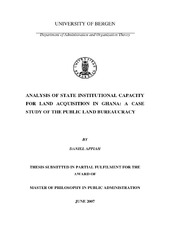Analysis of state institutional capacity for land acquisition in Ghana: A case study of the public land bureaucracy
Master thesis
Permanent lenke
https://hdl.handle.net/1956/2564Utgivelsesdato
2007Metadata
Vis full innførselSamlinger
- Department of Government [457]
Sammendrag
Gaining access to land is a problem that confronts both Government and non statecapitalist agents in Ghana. The study examined why the state lacks an effectiveinstitutional capacity with the political and technical competence to mediate conflictof interests in its domestic land polity for land acquisition. It was interesting toobserve that even Governments faced problems of land acquisition within thesovereign boundaries of the state. The investigative searchlight was therefore put onthe competence of the public land bureaucracy to mediate conflict of interests amongautonomous rational actors in two empirical cases of government land acquisition.From the perspective of the rational institutional political theory, the study discoveredthat the public land bureaucracy lack any formal obligations with traditional landowners and land tenants for these actors to collectively engage Government in arational discourse of land acquisition. On the contrary, the public land bureaucracyhas not shed off its post-colonial cloth as an institution of violence used byGovernments to deconstruct rival traditional land institutions. The traditional landinstitutions however own about 80% of the country’s available land. Moreover,traditional land institutions continue to receive social legitimacy and among thegeneral populace. Conversely, the power status of the public land bureaucracy haveseen continued decline in line with its negative productive efficiency.Underlying the problems of government land acquisition is a constitutionallybifurcated state with divided sovereignty over its land and people; whose public landbureaucracy lacks the political competence to mediate conflict of interests amongGovernment, Traditional Authorities, and Land Tenants in discourses of landacquisition. The traditional state makers who laid the foundations of the state throughwar-making are in conflict over land ownership with the modern state makers whoalso inherited the state from colonial mercantilist powers. The emerging hypothesisfrom the study is that; a political institution with strong institutionalized obligatoryrelationships with relevant autonomous rational actors is more likely to competentlymediate conflict of interests in a discursive object or issue, than a political institutionthat has weak or no institutionalized obligations with relevant autonomous rationalactors within its institutionalized environment.
Utgiver
The University of BergenOpphavsrett
The authorCopyright the author. All rights reserved
